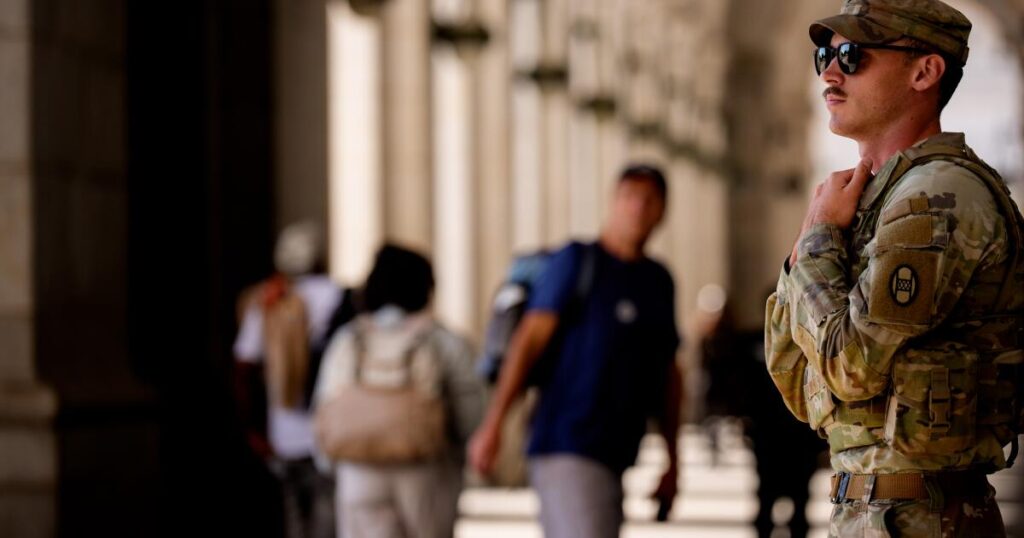With this administration, it’s another day, another unwinnable fight. All with a real war coming over the horizon.
President Trump campaigned on ending the “forever wars,” but he’s since launched two new ones: a shooting war on drugs in the Caribbean and a symbolic war on crime in America’s cities. Neither will ever end and both will tie our military down, just as the most potent threat America’s ever known is rising and readying to fight.
Let’s start with the real war. China is America’s only real competitor, an adversary far more powerful than the Soviet Union ever was. President Xi Jinping has directed his military to be able to take Taiwan by 2027, and they’re nearly set. U.S. Admiral Sam Paparo, America’s military commander in the Pacific, testified in the spring that this activity against Taiwan grew 300% in 2024. These aggressive actions, he said, are “not just exercises; they are rehearsals,” adding that “we must be ready today.” China’s recent military parade put a missile-shaped exclamation on Paparo’s point.
But America’s not preparing for real war right now. And because the world knows that America’s not preparing, America’s not deterring.
Instead we’re sending the Navy to blow up a drug dealer and deploying the National Guard to walk around Los Angeles, Washington and maybe Chicago. These distractions degrade military readiness at a time when we need all the ready we can get.
Last week, the Trump administration killed 11 people when it struck a four-engine speedboat in the southern Caribbean. The president said it was transporting drugs from Venezuela to the U.S. There’s much to consider: whether the strike was legally justified, or possibly illegal murder; or whether the administration should have notified and gotten authorization from Congress.
Setting those aside for the moment, let’s focus on whether a war on drugs in the Caribbean is a prudent use of military assets. The Pentagon sent to the region three guided-missile destroyers (around 1,000 sailors), an Amphibious Readiness Group (4,500 sailors) and a Marine Expeditionary Unit (2,200 Marines), along with surveillance planes, special forces assets, and a submarine. All to destroy a single speedboat? One that may or may not have been carrying a few kilograms of cocaine, or may have been carrying people on a human smuggling run.
Last year, just doing its job, American law enforcement seized 63 metric tons of cocaine. At that rate, the same day as the strike, we could assume that American law enforcement seized about 172 kilograms of cocaine alone, all without an additional armada.
There’s a reason we don’t use blowtorches for brain surgery and knives with soup bowls. They don’t work. Neither will sending thousands and thousands of sailors and Marines — at enormous cost in taxpayer money and troop training — to fight a second war on drugs, one boat at a time.
Consider the American military’s most recent history with drug interdiction. We wanted drug production to go down in Afghanistan, but it tripled in our two decades there. Or take it from Nixon: Wars on drugs don’t end well. Because they simply don’t end.
Neither will the new symbolic war on crime in U.S. cities. Again, costly, when one considers we already have a tool in the box for crime. The National Guard and Marine deployment to Los Angeles cost America $120 million for approximately 5,000 troops over 60 days (some 300 remain today). Washington, as a federal city, has taken on approximately half those used in California, which brings the total bill closer to $200 million for these unnecessary additional measures.
But what’s worse, far worse, is what the soldiers are doing. CNN recently reported that one soldier’s mission in Washington is to walk around Chinatown from 4 p.m. to 4 a.m. every day. Another from Mississippi said she’d been routinely cursed at. Yet another guardsman from Louisiana admitted confusion about what the military was even there to do.
The president has said he wants Chicago to be next (“Chipocalypse Now”). The city’s mayor and the governor of Illinois have stood against such a move. It appears the people of Chicago are considering even stronger opposition. This summer a research center at the University of Chicago found that 60% did not approve of the Trump administration’s immigration enforcement. It also found that 28% would “attend a protest against the Trump administration’s efforts to deport illegal immigrants, even if it became violent.”
With Chicago’s 2.5 million people, even if the survey counted too many tough talkers — if only 10% of the citizens there were willing to physically contest a deployment that was part of an immigration enforcement roundup — that’s hundreds and hundreds of thousands against handfuls of troops. Not one American soldier ever signed up to police Chicago.
Back in Washington on Friday, President Trump signed an executive order changing the Department of Defense’s title to the “Department of War” in large part because he believes it will get the country back to fighting “to win.” But when you start a new war on drugs and a new war on crime, when you send the ax instead of the scalpel — you’ll never win. You’re just signing America up for two more forever wars, two more unwinnable fights.
And the only one playing to win is Beijing.
ML Cavanaugh is the author of the forthcoming book “Best Scar Wins: How You Can Be More Than You Were Before.” @MLCavanaugh
